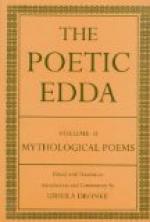“Sigurd was slain south of the Rhine; a raven on a tree called aloud: ’On you will Atli redden the sword; your broken oaths shall destroy you.’ Gudrun Giuki’s daughter stood without, and these were the first words she spoke: ’Where is now Sigurd, the lord of men, that my kinsmen ride first?’ Hoegni alone made answer: ’We have hewn Sigurd asunder with the sword; the grey horse still stoops over his dead lord.’”
This agrees with the Old Gudrun Lay and with the Continental German version, as a prose epilogue points out.
Of the Giuking brothers, Gunnar appears only in a contemptible light: he gains his bride by treachery, and keeps his oath to Sigurd by a quibble. Hoegni, who has little but his name in common with Hagen von Tronje of the Nibelungen Lied, advises Gunnar against breaking his oath, but it is he who taunts Gudrun afterwards. The later poems of the cycle try to make heroes out of both; the same discrepancy exists between the first and second halves of the Nibelungen Lied. Their half-brother, Gutthorm, plays no part in the story except as the actual murderer of Sigurd.
The chief effect of the influences of Christianity and Romance on the legend is a loss of sympathy with the heroic type of Brynhild, and an attempt to give more dignity to the figure of Gudrun. The Shield-maiden of divine origin and unearthly wisdom, with her unrelenting vengeance on her beloved, and her contempt for her slighter rival ("Fitter would it be for Gudrun to die with Sigurd, if she had a soul like mine"), is a figure out of harmony with the new religion, and beyond the comprehension of a time coloured by romance; while both the sentiment and the morality of the age would be on the side of Gudrun as the formally wedded wife. So the poem known as the Short Sigurd Lay, which has many marks of lateness, such as the elaborate description of the funeral pyre and the exaggeration of the signs of mourning, says nothing of Sigurd’s love for Brynhild, nor do his last words to Gudrun give any hint of it. The Nibelungen Lied suppresses Sigurd’s love to Brynhild, and the magic drink, and altogether lowers Brynhild, but elevates Gudrun (under her mother’s name); her slow but terrible vengeance, and absolute forgetfulness of the ties of blood in pursuit of it, are equal to anything in the original version. The later heroic poems of the Edda make a less successful attempt to create sympathy for Gudrun; some, such as the so-called First Gudrun Lay, which is entirely romantic in character, try to make her pathetic by the abundance of tears she sheds; others, to make her heroic, though the result is only a spurious savagery.




